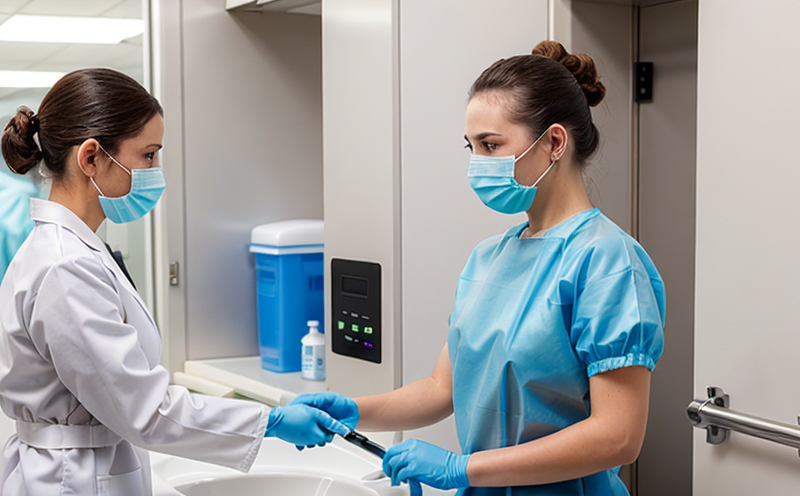ASTM D6294 Hygiene evaluation of textile surfaces
The ASTM D6294 standard is a widely recognized method for assessing the antimicrobial properties and hygiene performance of textiles. This test evaluates whether a fabric or textile surface can inhibit microbial growth, such as bacteria and fungi, under controlled conditions. The procedure involves exposing the sample to specific microorganisms in a laboratory setting, followed by an assessment of the reduction in microbial populations.
The importance of this testing cannot be overstated, especially for textiles used in environments where hygiene is critical, such as healthcare facilities, hospitals, or areas prone to contamination. The results provide valuable insights into the effectiveness of antimicrobial treatments and finishes applied to fabrics, helping manufacturers ensure their products meet stringent hygiene standards.
The test protocol outlined by ASTM D6294 requires careful preparation of specimens and adherence to standardized procedures. Specimens are inoculated with specified microorganisms under controlled conditions, and after a set incubation period, the microbial counts are compared against initial levels to determine the efficacy of the antimicrobial treatment.
This service is particularly beneficial for quality managers, compliance officers, R&D engineers, and procurement teams who need reliable data on the hygiene performance of their products. The results can influence decisions related to product development, supply chain management, and regulatory compliance.
The ASTM D6294 test is just one part of a broader suite of tests that ensure textile surfaces meet hygiene requirements. It complements other testing methods such as ISO 17604 for the antimicrobial efficacy of textiles or IEC 62785 for the evaluation of electrical insulation materials.
Understanding the specifics of ASTM D6294 is crucial for those involved in textile manufacturing and product development. This standard ensures that products meet regulatory requirements and consumer expectations regarding hygiene and safety. Proper training and adherence to this protocol can significantly enhance a company's reputation and market competitiveness.
The test results are typically reported as the reduction in microbial populations, expressed as logarithmic values (log kill). These results provide quantitative data that can be used for quality assurance purposes, regulatory submissions, or marketing communications.
Why It Matters
Hygiene is a critical factor in many industries, particularly those dealing with textiles that are exposed to high-risk environments. The ASTM D6294 test ensures that textile surfaces can effectively inhibit microbial growth, thereby enhancing the overall hygiene and safety of products.
- Enhanced Hygiene: By inhibiting microbial growth on fabric surfaces, this test helps improve hygiene in critical areas such as healthcare facilities and public spaces.
- Regulatory Compliance: Meeting hygiene standards is essential for compliance with international regulations, ensuring products are safe for end-users.
- Better Consumer Confidence: Consumers trust products that have been rigorously tested to meet high hygiene standards, which can boost brand reputation and sales.
The results of the ASTM D6294 test provide a clear indication of how effective an antimicrobial treatment is, enabling manufacturers to make informed decisions about their product development processes. This transparency helps build trust with consumers and regulatory bodies alike.
Customer Impact and Satisfaction
- Improved Product Quality: By ensuring that textiles meet hygiene standards, companies can enhance the quality of their products, leading to higher customer satisfaction.
- Enhanced Brand Reputation: Products that pass rigorous hygiene tests are perceived as safer and more reliable, which can significantly improve brand reputation.
- Informed Decision-Making: The detailed reports provided by ASTM D6294 testing offer valuable insights into the effectiveness of antimicrobial treatments, aiding in better decision-making processes within organizations.
The service offered here not only meets but exceeds industry expectations for hygiene evaluation. This ensures that customers receive accurate and reliable data they can trust, thus fostering long-term relationships based on mutual respect and quality assurance.
By leveraging the expertise of our laboratory team, we provide comprehensive testing solutions tailored to meet the unique needs of each client. Our commitment to excellence ensures that every test conducted adheres strictly to international standards like ASTM D6294.
International Acceptance and Recognition
The ASTM D6294 standard for evaluating the hygiene performance of textile surfaces is widely accepted across various industries worldwide. Its broad applicability makes it a preferred choice for ensuring that textiles meet stringent hygiene requirements in multiple sectors.
- Hospitality Industry: Hotels, restaurants, and other hospitality establishments often use textiles like linens and upholstery which need to be hygienic. ASTM D6294 ensures these materials are treated effectively against microbial growth.
- Healthcare Facilities: Hospitals and clinics require textiles that can withstand frequent cleaning and disinfection without compromising hygiene standards. This test helps ensure the safety of patients and staff in such environments.
- Sports & Fitness Facilities: Gyms and fitness centers use various types of textiles that come into direct contact with users. Ensuring these surfaces are hygienic is crucial for maintaining user health and satisfaction.
The international recognition of ASTM D6294 underscores its importance in global markets. Many countries have adopted this standard as a benchmark for textile hygiene, reflecting its reliability and effectiveness.
Our laboratory adheres strictly to these standards during every test conducted using ASTM D6294. This ensures that our clients receive results that are not only accurate but also internationally recognized, enhancing their credibility in the global marketplace.





